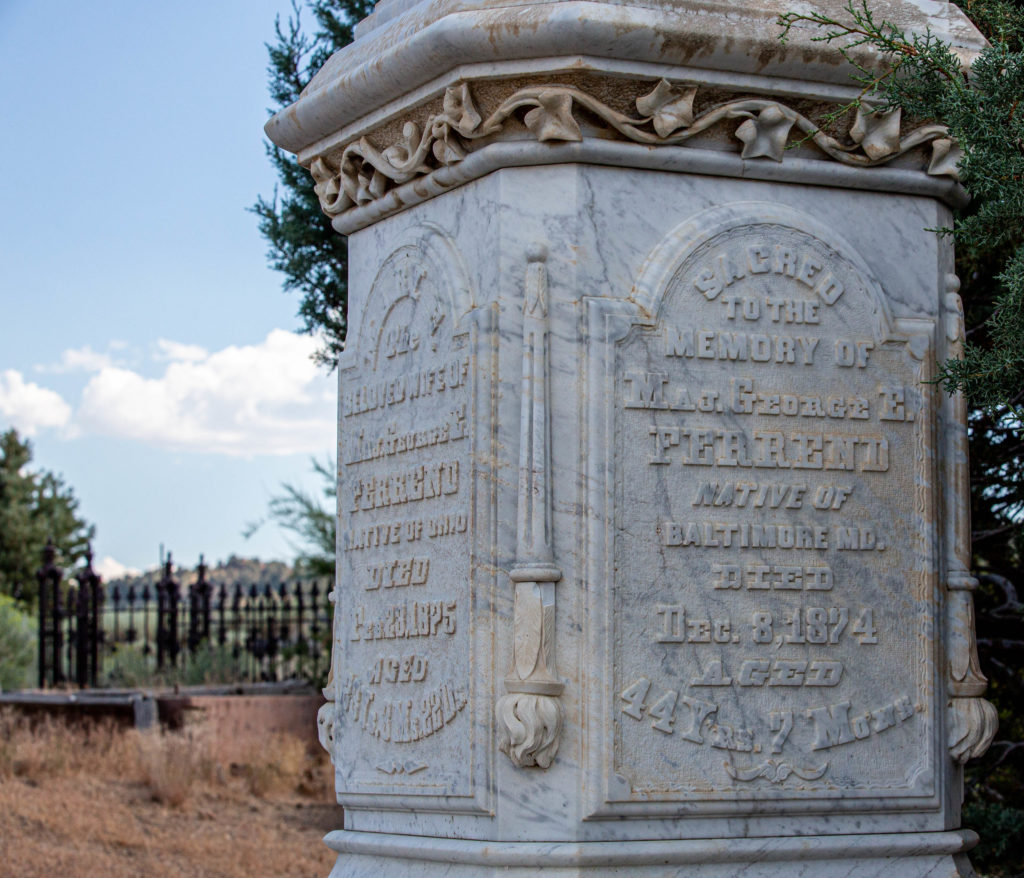
From a short visit to Virginia City, Nevada, in The Last Summer Before the Pandemic. (Caution: the following contains explicit details of gruesome Gold Rush-era saloon violence. )
We spent a couple minutes on the main street, but when I spotted the cemeteries on the north end of town, I knew that’s where I wanted to go. The carving on this monument drew my eye — it’s exquisite but restrained. I was slow to appreciate the inverted torches at the four corners. The inverted torch, a common motif on cemetery monuments, is said to symbolize death; the flame, eternal life.
As to Major George E. Ferrend: Who was he?
Below is an account of his passing, drawn from a January 1875 number of the London Illustrated Sporting and Dramatic News. The LIS&DN, which neglects to mention that Ferrend died in Virginia City, was republishing an account carried in a newspaper called the Pall Mall Gazette. The Gazette, in turn, appears to have borrowed its story from a somewhat more detailed account published Dec. 9, 1874, the day after Ferrend’s death, in the Virginia City Territorial Enterprise. None of the stories I’ve found mention his wife, who according to the monument died two months after her husband.
Among incidents not recounted here is Ferrend’s role as a second in an 1863 duel between the editor of the Territorial Enterprise and the editor of a rival publication. The Enterprise employed Mark Twain at the time.
Here’s the story recounting Major Ferrend’s life and demise:
DESPERATE END OF A DESPERATE LIFE
The death of an Englishman in California is reported by the San Francisco Call. On the morning of the 26th ult., Major George E. Ferrend, a well-known citizen of San Francisco and famous everywhere or the Pacific coast, shot himself in the head, and thus put an end to an eventful career.
Major Ferrend was born in Lancashire and was educated at the Royal Military Academy, Woolwich. He entered the Army, but owing to trouble of some kind sold out. He then went to Buenos Ayres, where he was the leading spirit in a revolution which was successful, but was subsequently driven out of the country, and came to California.
In June 1853, he left Sacramento with a company he had raised and joined General Walker in his Nicaragua expedition. With Walker, whose chief of artillery he was, he performed prodigies of valour, particularly distinguishing himself at the battle of Rivas, where at times he was a host in himself, loading and firing a gun which sent scores of the enemy to the ground at each discharge. During the Nicaragua campaign he was wounded 13 times, but these wounds were but a few of many others, for on his body there were 48 scars of wounds received in battles and personal conflicts at various times.
He had especially one terrible personal encounter in Camptonville, California, about the year 1858 with a man of desperate character, during which he received a most serious wound with an axe. He had previously had some trouble with this man, and it was understood that when they again met, they should “meet fighting.”
The desperado shortly after came into a saloon, armed with an axe, where he saw the major pleasantly sitting in his shirt sleeves with a large knife in his hand. As the desperado advanced, the major rose and stood warily watching his foe and perfectly motionless, save that he constantly turned the wrist of the hand that held the knife, so that the weapon disagreeably flashed in the eyes of his opponent.
All of a sudden, as the desperado’s eye was fixed on the knife, the major sprang forward with the leap of a tiger and drove the knife not through the heart but through the whole body of his foe, the point projecting at his back. At the same moment, the blade point projecting the axe was buried in the small of the major’s back. Both fell on the floor together.
The desperado was dead, but the major, contrary to expectation, recovered, and was as ready as ever for fresh exploits and adventures. His numerous deeds of daring would fill a volume. He ultimately settled in San Francisco, where he accumulated a considerable amount of property.
After shooting himself in the head, he lingered for a few hours and assigned as a reason for the act he had committed that he feared he would ultimately become insane owing to one of the wounds he had received which affected his head.
The major was proprietor of a well-known saloon bearing his name, he was much esteemed by all who had the pleasure of his acquaintance, and his death has greatly shocked the whole community of San Francisco. The only wish he expressed in his last moments was that “he might die a man.” He need hardly have troubled himself on this score, for whatever may have been his errors there was certainly nothing feminine in his nature. — Pall Mall Gazette
